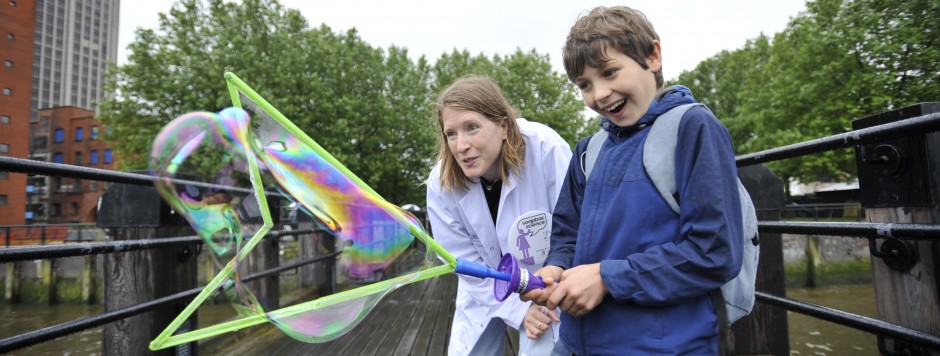 Prof Yvonne Buckley is based at the School of Natural Sciences and Trinity Centre for Biodiversity Research, Trinity College Dublin. She is an ecologist, who seeks to understand the fundamental drivers of animal and plant population processes in a rapidly changing world. Here, Yvonne (YB) talks to Soapbox Science (SS) about her enthusiasm for science communication, the importance of role models, and why we need to mainstream the consideration of diversity and gender within our own research, teaching and networking.
Prof Yvonne Buckley is based at the School of Natural Sciences and Trinity Centre for Biodiversity Research, Trinity College Dublin. She is an ecologist, who seeks to understand the fundamental drivers of animal and plant population processes in a rapidly changing world. Here, Yvonne (YB) talks to Soapbox Science (SS) about her enthusiasm for science communication, the importance of role models, and why we need to mainstream the consideration of diversity and gender within our own research, teaching and networking.
SS: Hi Yvonne! We are very glad to have you as a speaker this year. Maybe, to start with, you can tell us about how you did get to your current position
YB: Hard work, adventures and some luck! I’ve come full circle in my career, I left Ireland as to study at Oxford and then spent the next 20 years studying and working in the UK and Australia with additional field trips to Turkey, Vietnam, Mexico and New Zealand. I was encouraged to apply for my current position, as Professor of Zoology at Trinity College, University of Dublin, through a chance meeting with a colleague at a conference.
SS: What, or who, inspired you to get a career in science?
YB: As far back as I can remember thinking about careers I knew I wanted to do research, I wanted to find out about how the world works. Growing up in rural Ireland I was immersed in the natural world, I had a privileged childhood with so much freedom to explore and as children we were given responsibilities to look after the many animals that came our way. The importance of hard work, independence, and a love of adventure were with me early, and have stayed with me.
SS: What is the most fascinating aspect of your research?
YB: Finding out things that no one else has thought to look for, or which only become apparent if you think about them a certain way. Plants and animals constantly surprise me in the range of strategies they use to live their lives. I’ll never forget the first time I saw insects down a microscope as an undergraduate it was like a whole new world was exposed – what were all these fascinating little creatures doing in the world?
SS: What attracted you to Soapbox Science in the first place?
YB: I thought Soapbox Science sounded like a great way to connect people to science. One of the great problems of our time is that as science becomes more and more essential to our everyday lives the public are getting increasingly remote from science. We have a responsibility to connect with the public, after all they fund our work, influence our governments to consider our findings and ultimate should benefit from our discoveries. I also like that Soapbox Science challenges the public’s perceptions of who scientists are. When I was going through my early career it was really important for me to see women with families and “normal lives” succeeding in scientific careers. Without those role models I might have thought it wasn’t the world for me.
SS: Soapbox Science Ireland is this Saturday! Sum up in one word your expectations for the day – excitement? fear? thrill? anticipation?
YB: Buzz
SS: If you could change one thing about the scientific culture right now, what would it be?
YB: Enough evidence has built up now for us to know that we (scientists who are men and women) have difficulty assessing other scientists in a gender blind way. The most important change that needs to happen is within our own heads – we need to mainstream the consideration of diversity and gender within our own research, teaching and networking. We should continue to study the social and cultural processes of these biases and embed the findings into our publishing, funding and networking cultures.
Some areas of science are becoming more team based and networking and collaboration skills are increasing in importance. We need to recognise the diversity of skills we now need to produce important outputs and reward teams as often as we reward individual brilliance.
I think that having lists of women working in particular fields can be helpful if we are seeking to augment our commonly male-biased shortlists with suitable candidates who are women. Women only prizes and honours are also helpful in that they raise the profiles of excellent women scientists and may make them more likely to be considered for mainstream prizes and honours.
SS: So what would be your top recommendation to a female PhD student considering pursuing a career in academia?
YB: Work with a supervisor who actively seeks to mentor, promote and reward his or her post-docs and students. Do your homework on your supervisor. I think that as a profession we don’t provide potential students or post-docs with enough information about our ability to supervise and mentor them. I would like to see supervisors have to put together a one-page report on their supervisory experience and the outcomes for their past students and post-docs. You can tell a lot about the culture of a lab from the characteristics and destinations of their people. It would also enable us to think explicitly about the mentoring experience we provide and the relative opportunities given to our male and female staff and students.
